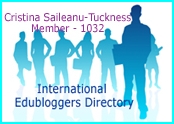Dear Mr. Orsini:
When I first read this article about you, a New Jersey principal who sent out an email urging parents to ban all social media access from their children, I was aghast. I have been tossing your email in my head for the past couple of days, thinking about the pros and cons of social media in the hands of our youth. As an educator who's taught at the middle school level for several years, as well as being a journalist in three different mediums, I feel my background knowledge sustains my belief that your request is doing our youth and parents a disservice.
This specific quote upsets me to the core:
There is absolutely no reason for any middle school student to be a part of a social networking site!
Of course there are, Mr. Orsini! Here are just a few articles explaining why some of the most popular social networking platforms are important in today's educational settings:
Twitter:
NYC’s 140 Character Conference Explores Twitter in the Classroom
Twitter for Learning – 55 Great Articles : eLearning Technology
Twitter in the classroom: 10 useful resources
Twitter in the Classroom: Studies Find Increased Student Engagement
Facebook:
25 Facebook Apps That Are Perfect for Online Education
100 Ways You Should Be Using Facebook in Your Classroom
Facebook Strategies For The Classroom
YouTube:
How to Use YouTube in the Classroom
Using YouTube in the ESL Classroom
Allowing Safe Access to YouTube in the Classroom
Social Networking in general:
How to Use Social-Networking Technology for Learning
Social networking in the classroom?!
Wikis, Blogs and Social Networking in the Classroom
How to Use Social Networking Technology for Learning
Another part of your email hit me like a ton of bricks:
Some people advocate that the parents and the school should teach responsible social networking to students because these sites are part of the world in which we live. I disagree, it is not worth the risk to your child to allow them the independence at this age to manage these sites on their own, not because they are not good kids or responsible, but because you cannot control the poor actions of anonymous others.
I'm not sure I understand how not teaching children or students about something that is a part of their world can lead them toward being more responsible, safe, or respectful. Instead of sharing ideas, role-playing situations, and engaging in deep discussions, do you really believe it would be better to act like the social networking gestapo? How could parents have open and honest discussions about anything with their children after your suggested reaction?
If I were to continue using your logic, I would also say parents should ban many books, most television and radio programming, and pretty much everything on the Internet. The basic message says, "Parents, there are bad people outside, so don't allow your children to go out there, not because you can't trust your children, but because you can't control anyone else." Parents never know when someone else will try to influence their children, but, according to you, it's better to just cut off all ties to the real world than try to teach children how to deal with real-world situations.
Maybe you have not had positive experiences with social media, Mr. Orsini, and therefore have decided to severe it completely instead of using other methods of fighting cyber-bullying, immaturity, and illegal Internet use. Here are a few suggestions that I feel would work better than an all-out social networking ban:
1. An Acceptable Use Policy (AUP), either school or district-wide, should be shared with all staff, parents, and students at the beginning of the school year, as well as throughout the year.
2. Teach media literacy either in all subjects or as a core subject. This Edutopia article explains how to use media literacy to foster critical thinking, which might be beneficial to your students beyond just the standard "because I said so" expression.
3. Update your pedagogy, whether through college classes or online webinars, of how to help students and parents progress with 21st century technology, instead of fighting it.
4. Give parents tools for all that you ask them to do, even the items you listed in your email. Many parents may not know how to log onto Facebook, search Internet history, or set parental controls on tech gadgets. Show them how to not only access their children's information, but how to speak to their children about such issues. Hold parenting classes for media and communication.
5. Last, yet certainly not least, remember why you became an educator. You are part of your students' lives for a short amount of time. How (not only what) you teach them now will affect them for the rest of their lives.
 RSS Feed
RSS Feed





